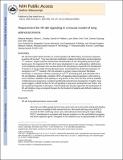Requirement for NF-κB signalling in a mouse model of lung adenocarcinoma
Author(s)
Meylan, Etienne; Feldser, David M.; Shen, Lynn; Turk, Erin; Ouyang, Chensi; Dooley, Alison L.; Jacks, Tyler E; ... Show more Show less
DownloadJacks_Requirement for NF-kappa.pdf (1.622Mb)
OPEN_ACCESS_POLICY
Open Access Policy
Creative Commons Attribution-Noncommercial-Share Alike
Terms of use
Metadata
Show full item recordAbstract
NF-κB transcription factors function as crucial regulators of inflammatory and immune responses as well as of cell survival. They have also been implicated in cellular transformation and tumorigenesis. However, despite extensive biochemical characterization of NF-κB signalling during the past twenty years, the requirement for NF-κB in tumour development in vivo, particularly in solid tumours, is not completely understood. Here we show that the NF-κB pathway is required for the development of tumours in a mouse model of lung adenocarcinoma. Concomitant loss of p53 (also known as Trp53) and expression of oncogenic Kras(G12D) resulted in NF-κB activation in primary mouse embryonic fibroblasts. Conversely, in lung tumour cell lines expressing Kras(G12D) and lacking p53, p53 restoration led to NF-κB inhibition. Furthermore, the inhibition of NF-κB signalling induced apoptosis in p53-null lung cancer cell lines. Inhibition of the pathway in lung tumours in vivo, from the time of tumour initiation or after tumour progression, resulted in significantly reduced tumour development. Together, these results indicate a critical function for NF-κB signalling in lung tumour development and, further, that this requirement depends on p53 status. These findings also provide support for the development of NF-κB inhibitory drugs as targeted therapies for the treatment of patients with defined mutations in Kras and p53.
Date issued
2009-10Department
Massachusetts Institute of Technology. Department of Biology; Koch Institute for Integrative Cancer Research at MITJournal
Nature
Publisher
Nature Publishing Group
Citation
Meylan, Etienne, Alison L. Dooley, David M. Feldser, Lynn Shen, Erin Turk, Chensi Ouyang, and Tyler Jacks. “Requirement for NF-κB signalling in a mouse model of lung adenocarcinoma.” Nature 462, no. 7269 (October 21, 2009): 104-107.
Version: Author's final manuscript
ISSN
0028-0836
1476-4687